Brown Collection: III. Homiletic Songs
III. Homiletic Songs
53. When Adam Was Created
54. Pulling Hard against the Stream
55. Paddle Your Own Canoe
56. Why Do You Bob Your Hair, Girls?
57. Meditations of an Old Bachelor
58. The Thresherman
59. You Say You Are of Noble Race
60. Who Is My Neighbor?
61. Dying from Home and Lost
62. The Wicked Girl
63. A Poor Sinner
64. Advice to Sinners
65. Wild Oats
66. You Can Run on a Long Time
III. HOMILETIC SONGS
THE MUSE of folk song has no antipathy to incyralizing; indeed, street balladry is rather fond of it. But among the preachments found in the North Carolina collection are few items that have any long traditional history. 'When Adam Was First Created' is on a theme, the proper relation between man and wife, that goes back to Chaucer and less definitely to medieval sermonizing. But most of the pieces of social moralizing, 'Pulling Hard against the Stream,' 'Paddle Your Own Canoe/ and the like, are certainly modern. 'Meditations of an Old Bachelor' and 'Why Do You Bob Your Hair, Girls?' reprove newfangled fashions. 'Who Is My Neigh-
bor?' and 'You Say You Are of Noble Race' are apothegms. Of those of a more definitely religious cast 'The Wicked Girl' is probably the oldest and certainly the most widely known.
53. When Adam Was Created
Whether or not this is to be admitted as folk song, it is at least traditional and embodies a piece of folk-wisdom — wisdom that goes back, as Jackson (Down-East Spirituals 77-8) shows, to Chaucer's "Parson's Tale" and back of that to church teachings as early as the twelfth century. As traditional song it exists in two forms, one of which may be called the English, the other the American form. The English form is traceable as far back as the middle of the eighteenth century and is found in Bell's Ballads and Songs of the
Peasantry of England (pp. 451-2 of the 1877 print), in Baring-Gould's Songs of the Blest No. 100 (from Devonshire), in Folk-Lore XXIV 82 (from (Oxfordshire), in Williams's collection (FSUT 115-16, from Oxfordshire), in a stall print without printer's name which I found in the Harvard College Library with the title 'The Honest Man's Favourite,' and is the version given by Newell (JAFL XII 250-1) as obtained from Mrs. E. Allen of Massachusetts. The American version is reproduced by Jackson from The Social Harp of 1855 (SFSEA 41, the first stanza only) and from The Original Sacred Harp of 191 1 (SFSEA 74-5, a complete text), is that which has been attributed to Lincoln, [So I am informed by Professor Francis Lee Utley, of Ohio State University, who has made a detailed study of this song.] was found by Sharp in North Carolina (SharpK 11 272), and is in our collection. Apparently it is of Southern origin; both The Social Harp and The Original Sacred Harp were compiled by Georgians, and Newell's Massachusetts text represents the English, not the American version.
'When Adam Was Created;' J.W. Mainer; Asheville, NC No date given- singer was 90.
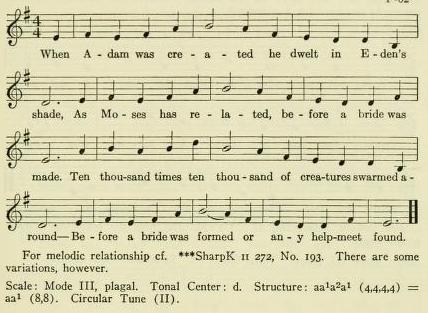
A. 'When Adam Was Created." A clipping from the Lenoir New's (also from the Lenoir Times — or are these one publication?) of January 27, 1914, sent in by J. L. Nelson. The piece was sent to the paper by S. C. Sherrill with a note that it was sung by Mrs. Nancy Coffee at the age of eighty-four. "Mrs. Coffee could not read, but had learned many hymns when young." With the music.
1. When Adam was created he dwelt in Eden's shade,
As Moses has related, before a bride was made.
Ten thousand times ten thousand creatures dwelt around
Before a bride was formed or any helpmeet found.
2. He had no conversation, he seemed like one alone.
Till at his consternation he found he'd lost a bone.
Great was his admiration when first he saw his bride.
Great was his adoration to see her by his side.
3. He spoke like one in rapture: I know from whence she came;
From my left side extracted, and woman is her name.'
This seems to be one reason why man should love his bride,
A part of his own body, the product of his side.
4. This woman was not taken from Adam's head, we know,
And she must not rule over him. 'tis evidently so.
This woman was not taken from Adam's feet, we see.
And he must not abuse her, the meaning seems to be.
5. This woman was extracted from under Adam's arm.
And she must be protected from injury and harm;
This woman was extracted from near to Adam's heart,
By which we are directed that they should never part.
6. Here's counsel to the bridegroom and counsel to the bride;
Let not this loaded volume be ever laid aside.
The book that's called the Bible be sure you don't neglect,
In every sense of duty it will you both direct.
7. To you, most noble bridegroom, to you I lay aside,
Be sure to live a Christian, and for your house provide.
Avoid all contentions, sow not the seed of strife;
That is the solemn duty of every man and wife.
B. 'Adam and Eve.' From Miss Sadie Johnson, as sung by her grandmother, of Dehart, Wilkes county, in 1936. It is the same version as A; but it has "maid" instead of "helpmeet" in line 4. "admiration" instead of "consternation" in line 6., "exultation" instead of "admiration" in line 7., and "alimation' 'instead of "adoration" in line 8., and from there on, though the matter is much the same, it has been so thoroughly rearranged that it seems best to give the text (it is here written in quatrains of short lines, so that the stanza numbering is
doubled.
5. He spoke as in a rapture;
'I know from whence she came;
From my left side extracted.
And woman is her name.'
6. The woman was not taken
From Adam's head, we know.
And he must not abuse her,
It's evidently so.
7. This woman was not taken
From Adam's feet, we see.
And she must not rule o'er him.
The meaning seems to he.
8. This woman she was taken
From near of Adam's heart,
By which we are directed
That they must never part.
9. This woman she was taken
From under Adam's arm
And she must he protected
From injury and harm.
10. Here's council for the bridegroom,
Here's council for the bride;
Be sure you hoth live Christians
And for your house provide.
11. Avoiding all contention.
Don't sow the seeds of strife.
This is the solemn duty
Of every man and wife.
12 This hook that's called the Bihle
Be sure you don't neglect ;
In every scene of heauty
It will you both direct.
54. Pulling Hard against the Stream
This homely homiletic is listed in the Pound syllabus, p. 54. and is given in Spaeth's IVcep Some More, My Lady, pp. 157-9, without author's name. The California Check List notes a print of it by De ^larsan, New York.
"Pulling Hard against the Stream.' Contributed by Miss Elizabeth Janet Black of Wilmington, formerly of Ivanhoe, Sampson county. In the first line "word" should probably be "world."
1 In this word I've gained my knowledge,
And for it have had to pay.
Though I never went to college
Yet Pve heard the poets say
Life is like a mighty river
Rolling on from day to day.
Men are vessels launched upon it,
Sometimes wrecked and cast away. So
Chorus: Then do your best for one another,
Making life a pleasant dream ;
Help a worn and weary brother
Pulling hard against the stream.
2 Many a high, good-hearted fellow,
Many a noble-minded man.
Finds himself in water shallow;
Then assist him if you can.
Some succeed at every turning;*
Others, too. tho' more deserving,
Have to pull against the stream.
3. If the wind is in your favor
And you've weathered every squall.
Think of those whose luckless labors
Never got fair winds at all.
Working hard, contented, willing.
Struggling thro' life's ocean wide.
Not a friend and not a shilling.
Pulling hard against the stream.*
4 Don't give way to foolish sorrow.
Let this keep you in good cheer:
Brighter days may come tomorrow
If you try and persevere.
Darkest nights will have a morning
Tho' the sky be overcast;
Longest lanes must have a turning
And the tide will turn at last.
[* The sixth line of stanza 2, "Fortune favors every scheme," has dropped out from Miss Black's text; and the last word of stanza 3 should be "tide."]
55. Paddle Your Own Canoe
This song, the work of H. Clifton, must have achieved considerable currency; it is given in both the Franklin Square Song Collection (ill 91) and Heart Songs (286-7). Davis reports it from Virginia (FSV 129).
'Paddle Your Own Canoe.' Contributed by Miss Duo K. Smith of Houstonville, Iredell county. Not dated.
1. I've traveled about a bit in my time
And of troubles I've seen a few,
But I found it better in every clime
To paddle my own canoe.
My wants are small; I care not at all
If my debts are paid when due;
I drive away strife in the ocean of life
AMiile I paddle my own canoe.
Chorus: Then love your neighbor as yourself,
As the world you travel through.
And never sit down with a tear or frown.
But paddle your own canoe.
2. I have no wife to bother my life.
No lover to prove untrue;
But the whole day long, with a laugh and a song,
I paddle my own canoe.
I rise with the lark, and from daylight till dark
I do what I have to do;
I'm careless of wealth if I've only the health
To paddle my own canoe.
3. It's all very well to depend on a friend,
That is, if you've proved him true;
But you'll find it better by far in the end
To paddle your own canoe.
To borrow is dearer by far than to buy,
A maxim, though old, still true ;
You never will sigh if you only will try
To paddle your own canoe.
4. If a hurricane rise in the mid-day skies
And the sim is lost to view,
Move steadily by, with a steadfast eye.
And paddle your own canoe.
The daisies that grow in the bright green fields
Are blooming so sweet for you ;
So never sit down with a tear or a frown,
But paddle your own canoe.
56. Why Do You Bob Your Hair, Girls?
Sounds more like a preachment than an attempt at humor, yet it may have come from the vaudeville stage. Randolph, reporting it from Arkansas, savs his informant called it a Holy Roller song (OFS1V83-4).
'Why Do You Bob Your Hair, Girls?" Obtained from Mrs. Minnie Church of Heaton, Avery county, in 1930.
1. Why do you bob your hair, girls?
It is an awful shame
To rob the head God gave you
To bear the flapper's name.
2. You're taking off your covering.
It is an awful sin.
Don't never bob your hair, girls;
Short hair belongs to men.
3. Why do you bob your hair, girls?
It's not the thing to do.
Just wear it, always wear it,
And to the Lord be true.
4. And when before the Judgment
You meet the Lord up there.
He'll say 'well done' for, wandering.
You've never bobbed your hair.
57. Meditations of an Old Bachelor
This, doubtless from the music-hall stage, modernizes a theme of which the pioneer age was fond. See 'Tlie Carolina Crew,' and 'When Young Men Go Courting,' and compare BSAI 426. This particular embodiment of the theme has not been found elsewhere. 'Meditations of an Old Bachelor.' Reported by Macie Morgan, Stanly county.
1. The girls today are different from those I used to know.
They never seem contented unless they're on the go.
I can't quite understand them; I'm fond of them, it's true,
But they ahvays keep you guessing as to what they'll say or do.
2. These made-up girls don't please me, At heart I'm really sick
Of painted checks and eyebrows and abundance of lip-stick.
On costly shows and cabarets your time and money's spent.
The modern girl, without a doubt, is always pleasure-bent.
3. The styles are all so different: short hair, short dresses too,
Womanly characteristics that we loved and prized are few.
But these modern girls are clever, and will keep you on the go,
And if you please their fancy they'll surely let you know.
4. No courting by the fireside as in the days of old,
But on the highways riding, in weather warm or cold.
They call you up and make the dates, do their courting too,
Now this is just their way, you say; to me it's wholly new.
5. The old-time girls were modest, endowed with queenly grace,
With voices soft and tender, a blessing to the race.
Now the mannish girls confront us, no more that graceful curl,
The average man is yearning for the good old-fashioned girl.
6. In dreams I'm often with them, the girls of other days.
The happy blushing maiden, who walked in wisdom's ways.
When with these gay young creatures my mind's kept in a whirl;
I'm longing — sadly longing — for the good old-fashioned girl.
58. The Thresherman
Well known in the old country — Burns contributed a text to the 1792 edition of Johnson's Muscidi, and it is still remembered in Scotland ( Ord 48-9); it has been reported from Westmorland (JFSS V 299). Berkshire and Oxfordshire (FSUT 138), Essex (JFSS II 198-9), Sussex (JFSS I 79), Hampshire (JFSS iii 202-3), and Dorset (JFSS v 202, tune only), and is also to be found in stall ballad print — but infrequently recorded in America:
Vermont (VFSB 157-9, from the Green Mountain Songster of 1823), New Jersey (JAFL iii 60), Virginia (JAFL xxx 354-5, FSV 169), Arkansas (OFS 1, 436), and now from North Carolina.
'Jolly Thrasher.' Contributed by Juanita Tillett of Wanchese, Roanoke Island, in March, 1923.
1. As I rode out a-hunting. a-hunting one day,
I met a jolly thrasher all on the highway.
With a staff upon his shoulder and a bottle of good beer
He was as happy as a lord with a thousand pounds a year.
2. 'O thrasher, jolly thrasher, come tell to me now
How you maintain your family with only one cow.
Your family it is large and your wages they are small,
And how you maintain them I know not at all.'
3. 'Sometimes a-hedging, a-ditching I go.
Sometimes I reap and other times I mow,
Other times 1 follow the harrow and the plow,
I earn all my money by the sweat of my brow.
4. 'When I go home at night just as tired as I can be.
I take the youngest child and I dangle him on my knee.
The other ones around me with their racket and their noise;
And that's all the comfort a poor man enjoys.'
59. You Say You Are of Noble Race
This fragment has not been found elsewhere. The collector's account of it suggests that the whole, if it could be recovered, would probably be a piece of moralizing.
No title. Contributed by Thomas Smith of Zionville, Watauga county, in 1915 with the following note: "Mrs. Polly Rayfield recalls one verse (if an old song sung by Thomas Williams (who was a great singer of old songs) over 40 years ago. Nothing more of the song can Mrs. Rayfield remember — not even the story, except that it was about a 'stuck up' young lady who refused to marry a young man because he was of a poor class of people."
You say you are of noble race
And I of low degree.
We are all of Adam's race;
Pray, what more can we be?
60. Who Is My Neighbor?
A bit of moralizing which I have not found elsewhere.
'Who is my Neighbor?' Reported by Carl G. Knox of Durham in 1924 or 1925. With the tune.
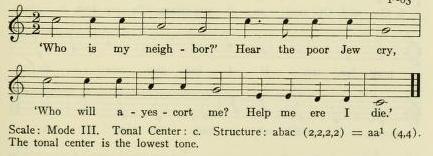
'Who is my neighbor ?'
Hear the poor Jew cry.
'Who will a-yescort me?
Help me ere I die.'
61. Dying from Home and Lost
Randolph, reporting this song from Arkansas and Missouri (OFS IV 41-3), says it seems to be part of a longer song written by the Reverend S. M. Brown and published in his Songs of Zion with a copyright date of 1892, and he quotes from a later print (James D. Vaughan's Crowning Praises, 1911, in which it appears) the de-
tailed story of the young man in whose mouth the song is put, killed in a bridge-building accident in Kansas City.
'Dying from Home and Lost.' Contributed by O. L. Coffey of Sinill's Mills, Watauga county, in August 1939.
1. Companion, draw nigh. They say I must die;
Early the stnnmons lias come from on high.
The way is so dark ! And yet I must go.
Oh, that such sorrow yott never may know!
Chorus: Only a prayer, only a tear.
Oh, if sister and mother were here!
Only a song; 'twill comfort and cheer,
Only a word from that book so dear.
2. Ah, can you not bow and pray with me now?
Sad the regret — we have never learned how
To come before him who only can save,
Leading in triumph through death and the grave.
3. And can you not sing a song of his love?
How he came down from the mansion above
To bleed and to die on Calvary's tree,
Bringing salvation to sinners like me.
4 Alas, it is so. But thus it must be,
No word of comfort or promise for me;
To die without God or hope in his son,
Covered in darkness, bereaved and undone.
5. O people of God who have his blest word,
Will you not heed the command of your Lord
And puhlish to all of Adam's lost race
Pardon, forgiveness, salvation through grace?
62. The Wicked Girl
Belden BSM 460-4 gives an account of the histury of this ballad, indicating its American (possibly New England) origin; cites printed and traditional appearances (including, among die former. The Original Sacred Harp, and among the latter, versions from Jamaica, Rhode Island, Virginia, West Virginia, Mississippi, Arkan-
sas, Indiana, and Iowa) ; and prints four Missouri texts. See Hudson JAFL XXXIX 175 ff. for a counterpart from Mississippi. Add Chappell FSRA 194, Eddy BSO 305-6, Brewster BSI 303, Randolph OFS IV 16-20, and Davis FSV 298.
Of the following North Carolina texts, A has considerable antiquity as judged by American folk-song tradition. In order and content of stanzas and in rhymes it is close to the Missouri A text, but lacks a stanza corresponding to the last stanza of that text.
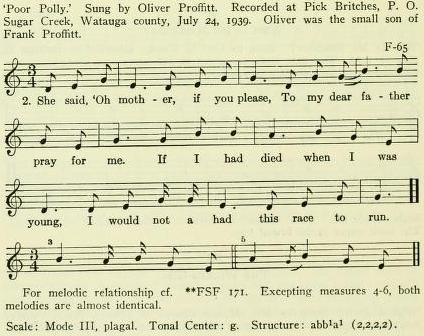
A. 'Young People Hark.' From the Adams manuscript book (western North Carolina, 1824-5), owned by W. Amos Abrams and copied by him for the Frank C. Brown Collection in 1944. Professor Abrams notes that he has several variants and that the song is known as 'Wicked Polly,' 'The Dying Girl Unprepared to Meet Her God,' 'The Downward Road Is Crowded.' etc. The manuscript spellings, lines, and stanzas have been followed verbatum et seratim. [I've edited some spelling- Matteson]
1 Young people hark & I will tell
the mysteries of a soul in hell
A woman who was young & fare
Who died in sin and black dispare
2 Her tender parents oft did pray
for her poor soul from day to day
they gave her council good advice
But she delighted still in vice
3 Shed go to frolick dance and play
in spite of all her friends could say
I'll return to God when I am old
And then he will recieve my soul
4 At length she heard the spirit say
thou sinful wretch forsake thy way
And return to me or you shall dwell
for ever in the flames of hell
5. I am too young she then replied
my comrades all will me deny
the spirit then bid her farwell
And so to commits this wreach to hell
6 It was [ ?| not long ere death did come
to call this hapless sinner home
And where-upon her dying bed
she called her friends & thus she said
7 My friends I bid you all farwell
I die I die I sink to hell
There I must lie & scream & cry
I'm lost I am (down) doomed forever more
8. her tender parents she address
I hope your souls will both be blest
but your poor child you now may see
but soon will be in misery
Amen
B. 'A Sad Parting.' From Mrs. Minnie Church, Heaton, Avery county, 1930. This is close to Brewster's BSI 303 text, from Indiana, having one more stanza (the last) than that.
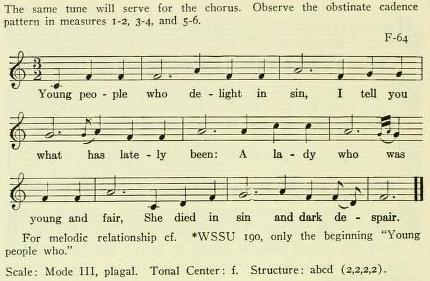
1. Young people who delight in sin,
I'll tell you what has lately been;
A lady who was young and fair,
She died in sin and dark despair.
2. She'd go to frolics, dance, and play,
In spite of all her friends could say.
'I'll turn to God when I get old,
And then He will receive my soul.'
3. On Friday she was taken ill;
Her stubborn heart began to fill.
'Alas! Alas! My days are spent —
Too late, too late now to repent.'
4. She called her mother to her bed;
Her eyes were rolling in her head.
'Oh, earthly mother, farewell;
Your wicked daughter screams in hell.'
5. She called her father to her bed,
Her eyes still rolling in her head.
'Oh, earthly father, farewell;
My soul is lost and doomed in hell.'
6. She gnawed her tongue before she died,
She wrung her hands, she screamed, she cried.
"Oh, must I burn forever more,
Ten thousand years rolls o'er and o'er?
7. "Young people, all with one accord
Take warning by my dying word.
You may escape these Hellish flames
While I am doomed to Endless Pain."
C. 'Wicked Polly." A phonograph recording made by Mrs. Church in 1939. The record has not been transcribed.
D. No title. One of several songs sent in September 1944 to Professor A. P. Hudson, Chapel Hill, by Mrs. Katherine Thomas, a teacher in the Durham High School for Negroes, who had been a member of one of Professor Hudson's classes at the North Carolina College for Negroes, Durham, in the spring of 1943. Regarding the songs, Mrs. Thomas wrote, "I secured most of them from my students."
1. Young people who delight in sin,
I'll tell you what has lately been.
A lady who was young and fair
Who died in sin and sad despair.
Chorus: She'd go to frocks,* dance, and play,
In spite of all her friends would say,
'I'll turn to God when I am old,
And then he will receive my soul.'
2 On Friday morning she took sick.
Her stumble heart begin to break.
'Alas, alas, my days I've spent.
Too late, too late for to repent!'
3 .She gnaw her tongue before she died,
She gown, she moun, she scream, she cried,
'Oh, must I burn forever more
Till thousand, thousand days are old?' **
4 She said. 'Oh, mother, mother, tell my mates
To turn to Ciod and seek His faith,
Upon their needs for mercy cry,
In sin and shame like Mary died.'
* So in the manscript- Read 'frolick,'
** usually o'er (over) Matteson
63. A Poor Sinner
This resembles in theme, tone, and style 'The Wicked Girl,' above, but seems to be an independent homiletic ballad. Dorothy Scarborough, SCSM 73, says that a Mrs. J. G. Stikeleather of Asheville "sang a fragment of song with a Kentucky scene" and prints a text with stanzas corresponding to the first and last of the following.
'A Poor Sinner.' From Miss Monnie McDonald, Lillington, Harnett county. Not dated. "From her grandmother, as sung at a camp meeting at Cool Springs Methodist Church, near Lillington, N. C, during the Civil War." A line seems to have been lost from the third stanza.
1. Hark, sinner, hark, while I relate
What happened in Kentucky State.
A poor young woman lately died;
She dropped from all her wealth and pride.
2. She once professed the Lord to know
And did with saints to meeting go,
But the young sinner drew her on
And brought her soul to laugh and scorn.
3. She called her father; thus she said;
'Oh, father, mother, fare you well!
Oh, brother, sister, fare you well!'
4. 'Oh, loving Betsy, fare you well!
I'm afraid your soul has gone to hell.'
She closed her eyes; her nails turned blue;
And she bade this world adieu.
64. Advice to Sinners
With music. From Miss Fannie Grogan, Silverstone, Watauga county. Words and air by Miss Grogan as "written April 16, 1916, for Lawton Grogan."
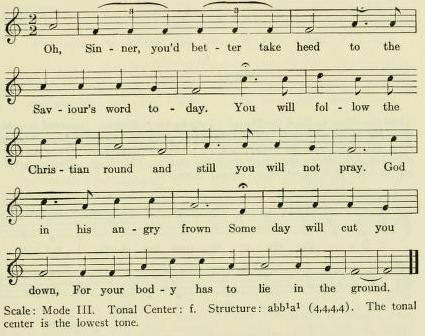
1. Oh, Sinner, you'd better take heed to the Saviour's word today,
You will follow the Christian round and still you will not pray.
God in his angry frown
Some day will cut you down,
For your body has to lie in the ground.
Chorus: Your body has to be in the ground.
You will follow the Christian round.
And you'll try to pull him down;
But your body has to lie in the ground.
2. You join the church, poor Sinner, with sin pollute God's land,
You never will be able before your God to stand.
You will travel on your ways.
And you'll sin away your days;
For your body has to lie in the ground.
3. Oh, Death will soon receive you; your breath you'll cease to draw.
When followed by the dragon it is then too late to war.
Woe and misery you will see
Throughout all eternity;
For your body has to lie in the ground.
4. When Gabriel sounds his trumpet, poor Sinner, you'll be lost.
You'll see the good old Christian come wagging with his cross,
With his garments white and clean.
Crying, 'Lord, I've been redeemed.'
For your body has to lie in the ground.
5. Now turn your back on Satan and give the Lord your heart.
My God sits in His kingdom and always does His part.
Oh, the angels they will shout
When He casts the Devil out.
For your body has to lie in the ground.
6. One minute spent in Glory will satisfy your mind
For all the worldly pleasures that you have left behind.
You will fly around God's throne
With Peter, James, and John.
For your body has to lie in the ground.
65. Wild Oats
There are in the Collection two — somewhat contradictory — versions of what Mrs. Emma M. Backus reports (JAFL xiv 297) as a singing- game played in rural Connecticut in 1865. Mrs. L. D. Ames reports it as a play-party song- in Missouri (JAFL xxiv 314). See also Botkin, API'S 36, 58 n., and 170-1. There is nothing to show, however, that it is a play-party song in North Carolina. It seems rather to he homiletic.
'Turn, Young Men.' From Miss Gertrude Allen (afterwards Mrs. Vaught), Taylorsville, Alexander county. Not dated, but sent in some time in the 1920s.
Turn, young men, from your evil ways ;
Go sow your- wild oats in the early days —
That you may be happy when you grow old.
B. No title. From Ethel Brown, Catawba county. Not dated.
Turn ye, young men, from your evil ways ;
Don't sow wild oats in your early days —
That you may be happy when you grow old.
66. You Can Run on a Long Time
From Julian P. Boyd, Alliance, Pamlico county, as collected from Minnie Lee, a pupil; undated, but c. 1927-28. "Negro fragment."
1. When I looked down into holiness,
I saw it true and plain;
I saw that I could not despise his word
And in his love remain.
Chorus: You can run on a long time
With the cover of the world pulled over your face;
You can run a long time;
But your sins are going to find you out.
2 Let me tell you about a liar.
He won't do to trust;
He'll tell a lie to make a fuss,
Tell another to make it wuss.
3. See that sister shoutin'?
She seems to be mighty glad.
But when you tell the gospel truth,
You are sho' to make her mad.
4. We have some folks in de church.
You have often heard it said;
You just can't live that holy life
Until you get upon your dying bed.
5. We have some brethren in the church
Who believe in having two wives.
You can call them up into counsel
But their temper will begin to rise.
6. Some women loving other women's husbands;
They had better be loving their own.
If they haven't got one, they had better get one,
Be ready when the judgment comes.
7. You told me you had been converted;
Be sure you do not lie.
They say that in my leather's house
They are holy and satisfied.
8. We have some sisters in the church ;
They say I am growing cold;
They say I'm doin' nothin' wrong
But tattlin' from do' to do'.